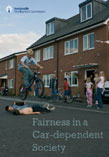We are the UK Government’s independent adviser on sustainable development. Through advocacy, advice and
appraisal, we help put sustainable development at the heart of Government policy
Publications
Fairness in a Car Dependent Society
| Date: | 21/03/2011 |
|---|---|
| Classification: | Transport |
| Document type: | SDC Reports & Papers |
| Download: | |
| Summary: |  Fairness in a Car Dependent Society, finds that vulnerable groups not only travel less than other people, they carry a greater burden of the costs of other people’s travel, including air pollution, noise, traffic danger, injury and crime. Other findings include: Fairness in a Car Dependent Society, finds that vulnerable groups not only travel less than other people, they carry a greater burden of the costs of other people’s travel, including air pollution, noise, traffic danger, injury and crime. Other findings include:• The richest 10 per cent of the population benefit from receive four times as much public spending on transport as the poorest 10 per cent • Children of the lowest socioeconomic groups are up to 28 times more likely to be killed on the roads than those of the top socioeconomic group • The most common cause of death for children aged 5-14 years is being hit by a vehicle • Those in the top income quintile travel two and half times as far as those in the bottom income quintile and three times as far by car • In the lowest income quintile, less than half of adults hold a driving licence and less than half of households have a car whilst half of all households in the highest income quintile have two or more cars. For those claiming income support or jobseeker’s allowance, car access figures are even lower – almost two thirds do not have access to a car and a licence to drive it • Car owners in the lowest income quintile spend 25 per cent of total household expenditure on motoring (by comparison spending 10 per cent of income on household energy bills is defined as ‘fuel poverty) People living in rural areas now see car ownership as a necessity and around 90 per cent of households have at least one car. The cost of motoring was found to account for 60 to 100 per cent of the additional income calculated as being required for rural dwellers to meet a minimum socially acceptable standard of living commensurate with urban dwellers • SDC estimate that the total cost of our level of car dependency significantly exceeds the £48 billion per annum in taxes and charges on UK road users. The report is recommending a new approach to transport policy in line with the Coalition Government’s commitment to fairness as one of its three guiding principles. The Commission’s recommendations centre on its Transport Hierarchy for policy makers, calling on policy-makers to prioritise reducing the demand for transport; encouraging more sustainable modes of transport and improving the efficiency of existing modes of transport over increasing the capacity of the transport system. |
